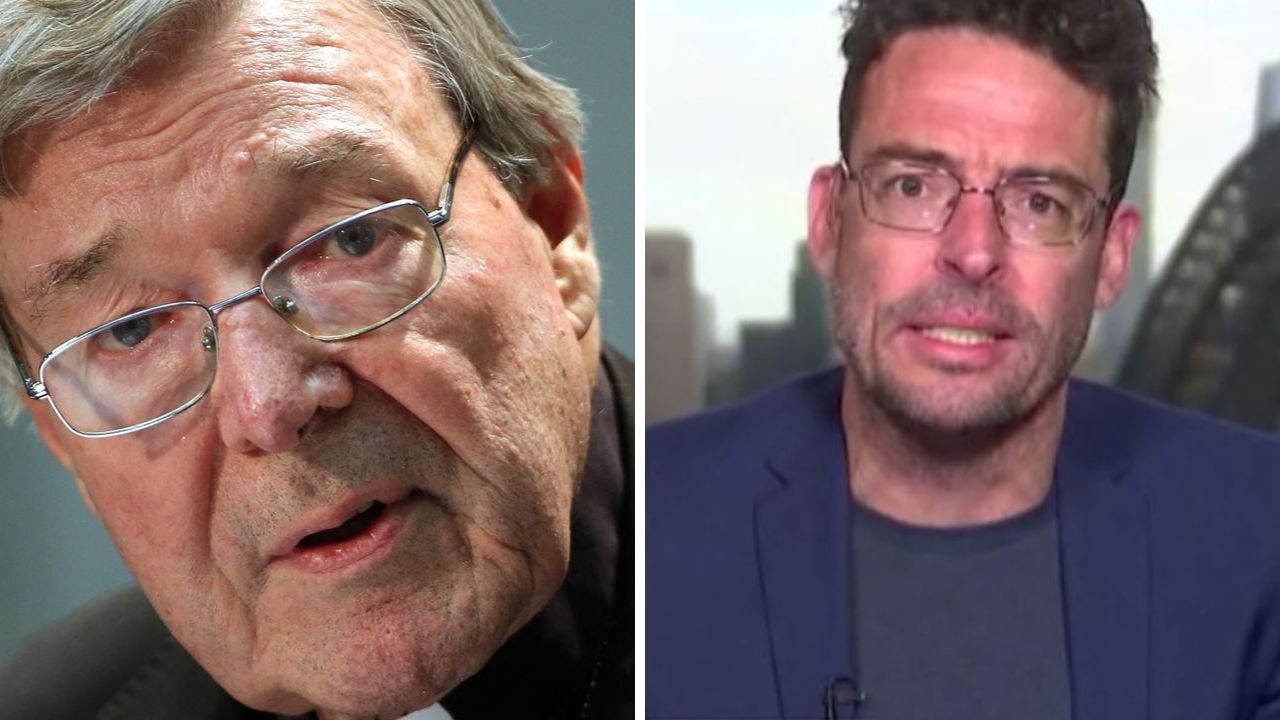George Pell’s answer to gay question that floored me
When Joe Hildebrand met George Pell in his Sydney residence to discuss life and everything, there was one thing he never expected to hear.
Many years ago I sat down with George Pell in his residence next to Sydney’s St Mary’s Cathedral to discuss – quite literally – life, the universe and everything.
It was a deep and wide-ranging discussion and one of the things I asked him was why, as Archbishop of Melbourne, he had infamously refused to give communion to gay parishioners.
His response surprised me. He said he would have given communion to any number of gay parishioners. How would he have known?
What he couldn’t do – or refused to do – was give communion to those who presented before him in a rainbow sash. This he saw as an act of defiance against the Catholic Church and that was something he could not countenance.
He didn’t say it with any fire and brimstone zeal. Like everything else he said, it was softly spoken and matter-of-fact but uttered with absolute certainty.
I marvelled at, perhaps even envied, the fact that someone could be so completely sure of themselves and their convictions.
More importantly it gave me an insight into Pell that stayed with me throughout his long interrogation and prosecution over child sex abuse within the church.
Pell’s ultimate conviction, the one that transcended all others, was that the Catholic Church – at least the church as he saw it – must be obeyed, championed and protected at all costs.
Those who defied the church must be opposed, those who sought to harm it must be defeated and those who defamed it must be silenced.

Thus the rainbow-clad Catholics who so desperately wanted him and their church to accept them were effectively excommunicated by him not so much because they were gay but because they dared to challenge the church as he saw it.
This worldview left me convinced that Pell would have had no compunction whatsoever in committing the many moral crimes levelled against him by survivors of child sex abuse and the subsequent Royal Commission.

I had no doubt that Pell would have attempted to silence victims with money or words and would have tried to quietly cover up or move on abusers all for the sake of defending the honour of the church.
But it also left me deeply sceptical about the claims that Pell himself had committed some of these atrocities.
Even setting aside the question of whether someone so deeply fundamentalist in their convictions would so callously and carelessly breach them, I suspected he would never commit such crimes for the same reason he covered them up: It would bring his beloved church into disrepute.

In the end, the full bench of the High Court unanimously supported this fact, if not the psychoanalysis behind it. They found that he didn’t, and I believed he wouldn’t.
But that doesn’t absolve Pell of his myriad other sins. They will be reckoned by his maker – whom, if the Cardinal is correct, he has already met.
Meanwhile, for those of us still here on Earth, there are many more important problems to contend with. And I don’t see how they will be solved by shouting at a corpse.
In the Catholic sphere – which is the dominant force of Christianity, which is the world’s largest religion – there are serious questions about how the church condemns genuine abuse and aberrations within its institutions and, conversely, how it embraces things it once wrongly considered aberrations.

This is vital, because I am convinced that part of the reason the church for so long failed to act on paedophilia was because they simply lumped it into the same grab-bag of sins as homosexuality, adultery and promiscuity.
Thus an unspeakably heinous crime was historically treated in much the same way as what church leaders saw as mere failure to adhere to the one true path.
The dark irony is that the church, culturally, has for years quietly tolerated things it is technically against – divorce, sex before marriage, that one time in college – on a “don’t ask, don’t tell” basis, just as Pell essentially said. Its fundamental position is that everyone is a repentant sinner who will no doubt sin and repent again.

The problem is that it failed to differentiate between these supposed sins and outright atrocities, to the point where paedophilia was seen by some as merely an unfortunate lapse or human failing.
This fundamentalist view was the great undoing of George Pell. He saw so much sin that he couldn’t see the sin that really mattered.
The Catholic Church has changed an enormous amount since those days. It is now led by a Pope who has an impeccable legacy of dedication to the poor and has constantly preached a message of inclusion and love. There is also a new fierce vigilance against all forms of abuse.
But both the Mother Church and all the ever-emerging new arms of Christianity will inevitably fail in their reach if they focus on a doctrine of exclusion instead of embrace.
By unwaveringly adhering to the letter instead of the spirit of the Christian message, George Pell was hounded to his grave.
Perhaps his final gift to the church he loved was an example not to follow.






